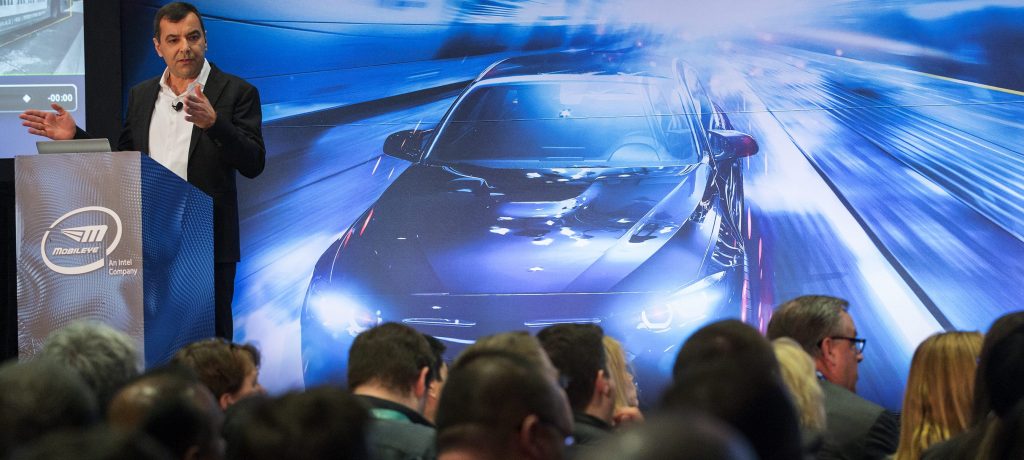Mobileye CEO and co-founder Amnon Shashua, announced two new partnerships for the Jerusalem-based developer of driver assistance systems this week during his annual address at CES Las Vegas on Wednesday. The company also released a video showing their self-driving vehicle navigating Jerusalem using cameras, but no other sensors.
Mobileye is the developer of driver assistance system acquired by Intel Corporation for $15.3 billion in 2017 in what is the biggest deal in Israeli high-tech history.
The firm announced two new partnerships for the deployment and testing of its autonomous vehicle technologies.
Shashua confirmed an agreement with leaders of the city of Daegu, South Korea to “establish a long-term cooperation to test and deploy robotaxi-based mobility solutions powered by Mobileye’s autonomous vehicle technology,” the company said in a press release from Intel.
According to the agreement, Mobileye will integrate its self-driving system into vehicles in Daegu to enable a driverless mobility-as-a-service (Maas) operation.
SEE ALSO: Moovit-Mobileye Partnership Signals New Era For Urban Mobility
Mobileye also announced a new agreement with SAIC, a leading Chinese OEM to use Mobileye’s Road Experience Management (REM) mapping technology to map China for L2+ ADAS deployment in order to prepare the country for autonomous vehicles.
The company says its REM technology is a fast and cost-effective way to create high-definition maps that can be utilized for enhanced ADAS such as L2+, as well as higher levels of autonomy for future self-driving cars. Mobileye’s REM map data has significant value beyond the automotive industry and can bring insights to businesses in new market segments, such as smart cities, the company said.
The deployment of the mapping solution in China presents opportunities for additional OEM partners to enter the Chinese market with map-related features, the company said.
“These two new agreements build our global footprint in both MaaS and ADAS and demonstrate our commitment to true global leadership toward full autonomy,” Shashua said in another statement.
Other deals announced last year show how Mobileye will execute “on its multiprong strategy towards full autonomy, which includes mapping, ADAS, MaaS and consumer AVs,”
Sign up for our free weekly newsletter
SubscribeIn a collaboration agreement with NIO, a pioneer in China’s electric vehicle market, Mobileye aims to partner on the development of highly automated and autonomous vehicles (AV) for consumer markets in China and other major territories. NIO will engineer and manufacture a self-driving system designed by Mobileye, building on its Level 4 (L4) AV kit and sell consumer AVs based on that system. This self-driving system is said to be the first of its kind.
China is the first country to benefit from the four Mobileye strategic product categories, a statement said. Mobileye’s China footprint now includes L2+ ADAS, mapping (a first for China, MaaS, and consumer AVs.
Mobileye has agreed to a joint venture with transportation company UniGroup in China for use of map data.
In another agreement, Mobileye partnered with RATP Group (Régie Autonome des Transports Parisiens) and the city of Paris in November to collaborate on a robotaxi shuttle fleet which will be marketed worldwide. The autonomous transportation solutions will be based on Mobileye’s AV technology. Testing of the solutions will begin in Paris in 2020.
Mobileye will also partner with Volkswagon and Champion Motors in a joint venture to operate an autonomous ride-hailing fleet in Israel.
After calling on the industry to be “transparent” with its autonomous driving tech, Shashua showed a 23-minute unedited video of an autonomous vehicle driving down streets of Jerusalem using camera-only sensors.
SEE ALSO: Trailblazing Israeli Tech Heads To CES 2020
“Mobileye is developing two truly redundant sensing systems: one with surround-view cameras alone and the other with radars and lidars. In this unedited video demonstrating the camera-only technology in Jerusalem, you can see Mobileye’s car successfully navigate a complex driving environment heavy with pedestrians, unguarded intersections, delivery vehicles and more. This is the everyday capability of Mobileye’s technology,” the Intel press release said.
Shashua, who is also Intel Senior Vice President, discussed “VIDAR,” the company’s unique solution for “achieving outputs akin to lidar, using only camera sensors.” He explained how Mobileye achieves pixel-level scene segmentation to detect tiny fragments of road users and how Mobileye tech turns two-dimensional sensors into 3D understanding.
Intel said that 2019 was another record year for the company, with sales close to $1 billion “driven by significant growth in the ADAS market.” Sales are expected to rise to double digits in 2020.
Related posts

Editors’ & Readers’ Choice: 10 Favorite NoCamels Articles

Forward Facing: What Does The Future Hold For Israeli High-Tech?

Impact Innovation: Israeli Startups That Could Shape Our Future




Facebook comments